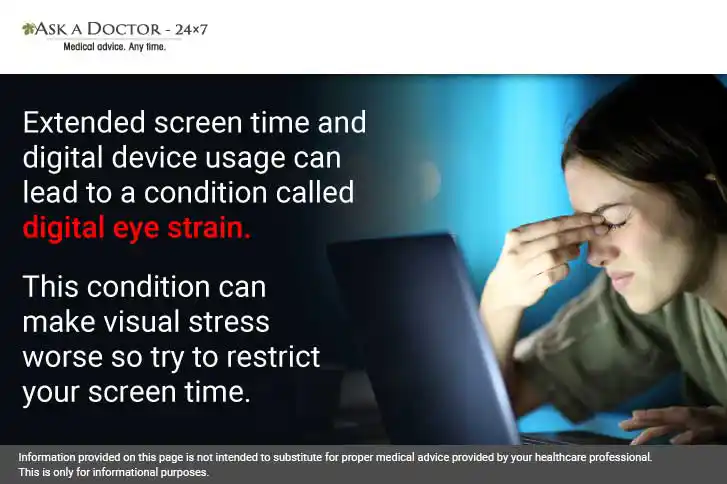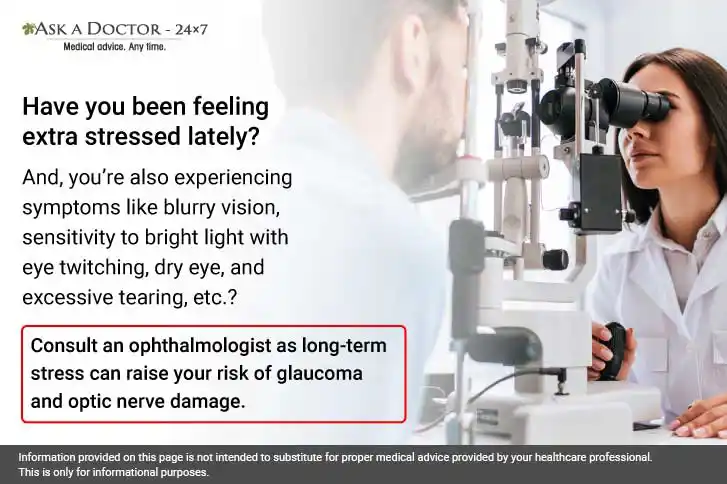How Does Chronic Stress Affect Your Eye Sight?
Anything that disturbs your body's natural homeostasis creates a response in the body. Natural reactions like stress can be either physical, emotional, mental, visual, or a combination of all of these. Any stress for a long period of time develops series of chemical reactions in the body. You may not be aware, but stress can also affect your vision.
Researchers have shown that mental stress can cause eyesight loss and related symptoms. The consequences of stress on your eyesight might range from dry eyes, blurry vision to eyesight loss. Either eye can be affected permanently or the symptoms may be constant or intermittent. Stress hormones have also been linked to a number of other eye issues, including inflammation and altered blood flow to the eyes.
Here in this blog our expert throws light on how stress can cause vision loss, Also read about a few simple tips to de-stress and improve your eye health.
How Does Stress Lead to Vision Issues?

There is a scientific link between stress and vision and their role in overall health. When you're stressed, your body releases the hormone adrenaline, that’s responsible for stimulating 'fight-or-flight' response. Adrenaline along with the stress hormone “cortisol” cause stress-related vision problems by putting more strains on the eyes. When the body is under stress, the pupils in case of a visual response enlarge to let in more light (so that you can see potential threats). Long-term high stress has also been associated with increased intraocular pressure (the pressure within your eyes), which raises your risk of glaucoma and optic nerve damage.
Hence, individuals with vision loss must be screened for depression and anxiety, as untreated mental health issues can further diminish their quality of life.
Symptoms of Stress-Related Eye Problems
- Blurry vision
- Headaches
- Eye strain
- Eye floaters
- Dry eye
- Sensitivity to bright light
- Eyelid twitch
The symptoms are more bothersome than debilitating. However, if these symptoms persist we advise to have your eyes examined.
Tips for De-stressing and Improving Eye Health
Once your body and mind are at ease, your stress-related visual symptoms should go away. De-stressing is thus the best course of action for your visual issues.
Consider the following advices to manage stress and reducing its impact on vision:
1) Utilize relaxing methods: To relax your mind and lessen stress, try yoga, meditation, deep breathing exercises journal your thoughts or join a support group.
2) Exercise frequently: Exercise can help you feel less stressed and enhance the flow of blood to your eyes.
3) Sleep peacefully: To completely relax the body and lower down the stress hormones it is pivotal to get a full eight hours of sleep at night. It’s also helpful to stop using your digital devices 30 minutes to an hour prior going to bed.
4) Frequent pauses from screens: Frequent screen breaks are necessary to prevent eye strain and dry eyes. Regular breaks from computer or smartphone devices can assist in relaxing your eyes.
5) Wear safety glasses: By wearing sunglasses and other protective eyewear, you may shield your eyes from dust, UV rays, and pollution.
6) Eat a balanced diet: To maintain healthy eye health, consume foods high in omega-3 fatty acids, vitamins A, C, and E. Also, drink plenty of water to hydrate your body and eyes.
When to Visit Your Doctor?

You should call your healthcare provider if you experience:
- Severe headache
- Difficulty speaking
- Facial drooping
- Loss of muscle control on one side of the body
- Severe eye pain
Hence, stress is a common response to the pressures of daily life and a normal part of living. However, when it becomes excessive or chronic, it can cause some major health problems, including problems with our vision. You should start introducing techniques for easing daily life stressors. Incorporate simple lifestyle adjustments like getting enough sleep, eating well, practicing meditation, or engaging in any stress-relieving activities. To make sure your vision problem is not something more serious, consult your doctor if you experience any of these symptoms combined with other health problems.
If you have any questions about vision problems, you can check with an Ophthalmologist online at Ask a doctor, 24x7.
Recently Answered Questions Related to Stress and Eye Health
- Can Stress Cause Eyelid Spasms?
- Suggest Treatment For Stress
- Can Stress Cause Black Eye?
- Does Stress Make You Age Faster?
- Does Computer Vision Syndrome Has A Permanent Effect On The Eye?
- What Is The Reason For The Severe Anxiety, Chest Pain, Bad Headaches And Choking Feeling?
- Can Tinnitus Cause Eye Stress?
- Suggest Treatment For Stress Management
Disclaimer: Information provided on this page is not intended to substitute for proper medical advice provided by your healthcare professional. This is only for informational purposes.
Ask a Specialist
Recent Questions


